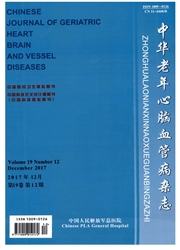

 中文摘要:
中文摘要:
BACKGROUND:Coronary microembolization(CME) is a serious complication following percutaneous coronary intervention(PCI) in patients with acute coronary syndromes.The use of metoprolol before PCI can significantly protect ischemic myocardium from myocardial damage,but the function of metoprolol in the treatment of CME is not entirely clear.This study was to explore the effect and significance of metoprolol on myocardial apoptosis and caspase-3 activation after CME in rats.METHODS:Thirty rats were randomly divided into three groups including sham-operation(control group),CME plus saline(CME group),CME plus metoprolol(metoprolol group),10 rats for each group.The CME group was induced by injecting 3 000 polyethylene microspheres(42 urn)into the left ventricle during a 10-second occlusion of the ascending aorta;the control group was injected with physiological saline instead of microembolization ball;the metoprolol or saline group was given three intravenous bolus injections before CME.Echocardiography,TUNEL staining,and Western blotting were used to evaluate cardiac function,proportion of apoptotic cells and activation of caspase-3 respectively at 6 hours after operation.RESULTS:Echocardiography parameters displayed that the metoprolol group improved cardiac function significantly compared with the CME group(PO.05).The myocardial apoptotic rate of the CME group as well as the contents of activated caspase-3 increased significantly(P<0.05),both of which were ameliorated significantly by metoprolol treatment(P<0.05).CONCLUSIONS:This study demonstrates that metoprolol can protect the myocardium during CME in rats by inhibiting apoptosis and improving cardiac function.These results suggest that the inhibition of apoptosis can be a potential therapeutic strategy for the treatment of CME.
 同期刊论文项目
同期刊论文项目
 同项目期刊论文
同项目期刊论文
 期刊信息
期刊信息
